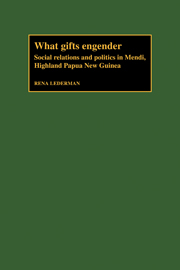Book contents
- Frontmatter
- Contents
- List of tables, figures, and maps
- Preface
- Acknowledgments
- 1 Mendi coming into view
- 2 Sem relations: solidarity and its limits
- 3 Twem: personal exchange partnerships
- 4 Gender ideology and the politics of exchange
- 5 Twem and sem in context
- 6 Sai le at Senkere: the politics of a Pig Festival
- 7 “Development” in Mendi
- Appendix A The research community
- Appendix B The “accounts sample” and some comments on research methodology
- Notes
- Glossary
- References
- Index
- Frontmatter
- Contents
- List of tables, figures, and maps
- Preface
- Acknowledgments
- 1 Mendi coming into view
- 2 Sem relations: solidarity and its limits
- 3 Twem: personal exchange partnerships
- 4 Gender ideology and the politics of exchange
- 5 Twem and sem in context
- 6 Sai le at Senkere: the politics of a Pig Festival
- 7 “Development” in Mendi
- Appendix A The research community
- Appendix B The “accounts sample” and some comments on research methodology
- Notes
- Glossary
- References
- Index
Summary
This book, a description and argument concerning social relations and politics in Mendi, is meant as a contribution to the comparative ethnography of Highland Papua New Guinea. In it, I attempt to demonstrate that Mendi culture and history are structured in terms of two principles of relationship: twem and sem. Whereas sem relations create bounded groups (“clans”) with an existence independent of particular individuals, twem relations generate egocentered, unbounded networks. Clans regulate access to land and are the primary organizational basis for male cooperation in ceremonial exchanges, whereas networks regulate access to fluid resources such as pigs, pearl shells, and money. While clan prestations require that the flow of wealth be dammed periodically, twem etiquette encourages the constant circulation of wealth. While clans are implicitly hierarchical, being exclusively male, twem networks are egalitarian and broadly inclusive, men and women, unmarried people, and old widows and widowers all participating in them.
On the basis of these and other contrasts developed in the chapters to follow, I will argue against the common assumption that network relationships are simply a means by which individuals accumulate valuables for display during clan festivals. I will argue instead that twem relations constitute a kind of sociality distinct from clanship; moreover, they involve an ethic of exchange contradictory to the ethic of clan solidarity. Although network and clan obligations may be fulfilled simultaneously (and are, in a sense, necessary to one another), they also sometimes conflict.
- Type
- Chapter
- Information
- What Gifts EngenderSocial Relations and Politics in Mendi, Highland Papua New Guinea, pp. ix - xPublisher: Cambridge University PressPrint publication year: 1986



